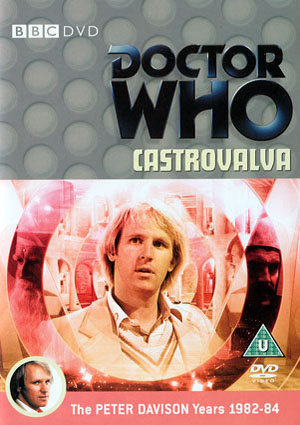
Aired on: 4 January – 12 January 1982
Following seven years with the larger-than-life Tom Baker as the charismatic Fourth Doctor, producer John Nathan-Turner and Doctor Who itself turn to Peter Davison to take over the reigns and see in a new era. The casting of Davison is quite a shrewd decision, bringing in an established dramatic actor already known for his compassionate and mischievous tendencies from All Creatures Great and Small. Unsurprisingly, it’s clear from the outset that the Fifth Doctor will be a very different personality than his predecessor as vulnerability, patience, optimism, and diplomacy come to the forefront amid a very crowded TARDIS, helping to completely reinvent the franchise while still remaining true to what has come before.
Even with his Doctor in a weakened state as he recovers from post-regeneration trauma, Davison does well in putting his youthful and optimistic mark on the role quickly. Unfortunately, the story itself is a mixed one, full of grand ideas but limited by more than the usual financial and technical shortcomings that can’t quite capture the ambition on display. Perhaps surprisingly given that this is the third of three loosely-linked stories with the Master as the driving force, the Master himself is treated as an incredibly generic villain who is written as evil just for the sake of being evil. Gone is the subtle but incredible strength and willpower so prevalent in ‘The Keeper of Traken,’ and nowhere to be seen is any real mention of the very personal ties to Nyssa and Tegan he forged through his horrendous actions in the previous two tales. Instead, he is written at perhaps his most incompetent level yet, an incredible downward spiral for the character given his lengthy history in Doctor Who and intriguing recent promise. Anthony Ainley truly is as enjoyable as ever here, but the script sadly takes him precariously close to pantomime levels on a few occasions.
Yet given the Master’s continued presence, ‘Castrovalva’ is primarily about establishing the new Doctor and the new TARDIS dynamic. In this respect, the characters of Nyssa and Tegan firmly establish themselves as individuals as they try to help the Doctor recover and create a sort of friendship quite quickly as their very distinct personalities become known. However, this is unfortunately not the case for Adric who, even as the Doctor lays out a clear plan involving all three companions’ defining traits to help him heal, is relegated to the background somewhat more than the other two as he seems to instead forge an uneasy alliance with the Master. The truth behind this is in itself a nice bit of characterization even if the execution falls a bit flat. However, even more than the companions, this is a story about Davison and his Doctor growing into the role, and the scenes in which he channels his predecessors and puts on a pair of spectacles to convey a much older man in a young body work quite well.
Like many scripts of the time, there is an underlying thematic narrative even as the script dabbles with New Age philosophies to tie into the process of regeneration, in this case recursion. This is mentioned in passing several times before manifesting in regard to Castrovalva itself, the truth of the city a nice counterpoint to the Fifth Doctor’s intrinsic optimism. Even with the budget and ambition at odds, the application of recursion to the sets and circumstances is a wonderfully high-brow concept that easily endures as time passes, giving Peter Davison ample opportunity in just one story to step out of Tom baker’s shadow and make the role his own in the process.


Leave a Reply